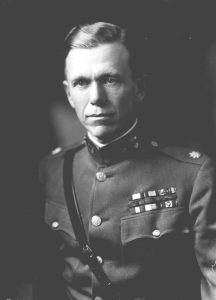Recently we looked into whether George C. Marshall made any statements regarding the 1918 influenza pandemic. Marshall does note divisions being out of commission here due to illness, but does not offer many opinions or feelings on the matter. What most affected Marshall was in 1917, before his journey overseas.

Marshall and Bell, July 1917. GCMF Photo Collection.
While mobilizing troops, General Bell was hospitalized in New York with a severe bout of influenza. This affected Marshall’s workload, and the promotions of several officers. Marshall discussed this in an oral history interview with biographer Forrest C. Pogue, which is summarized below.
Almost as soon as war was declared, General Bell was ordered to take command of the reorganized Department of the East, formerly under Major General Leonard Wood. Marshall left for Governors Island, New York, about April 26. Bell, who stopped by his hometown in Kentucky, contracted influenza on the train. Upon arriving at headquarters on May 1, about one-half day after Marshall, Bell went immediately into seclusion for treatment at the Rockefeller Institute in New York City.
It was a very strenuous time for Marshall. Bell had told his headquarters staff that he had to go on a trip and that Marshall would represent him, issue orders in his name, and transmit instructions to the staff.
So he went off and left me with a staff of about fifteen old colonels at the head of all the various departments, and I was the [captain] and all the pressure of the war was coming on.
One of the chief sources of pressure on Marshall was from people wanting to get themselves or someone else promoted or into the officers’ training camps—modeled on the Plattsburgh, New York, camp started by General Wood before the war—then in the process of formation. “The Governors Island ferryboat would be jammed with fellows coming over” seeking admittance.

Lt. Col. Marshall, 1918. GCMF Photo Collection
Everybody who was anybody, in a sense, was trying to get in, and each of them seemed to feel that political pressure was necessary and I was trying to demonstrate that it wasn’t necessary. We’d go at these things just on their face value and without any reaction to pressures. . . . All seemed to think they could get what they wanted right away just by the stating of their desire. I guess I probably stood this off, stood it off better than General Bell could, because I didn’t know them and they didn’t know me. . . . I was using three phones at the time, and I was being seen by everybody that came to the Island; so it was exceedingly hectic and I had to learn how to do business very quickly.
Rebuffed by Marshall, favor-seekers sought to discover General Bell’s whereabouts. But Marshall kept it a careful secret, although he himself had to go to the hospital every other day during the two weeks Bell was there.
It was quite a long drive and took quite a lot of time. And the visit there always took time because he was intensely interested in everything that was going on and I tried to tell him exactly what it was and particularly to tell him of the displeasure of his senior staff officers with the fact that I was doing several things.
Supplying the score or so of training camps in the department was another of Marshall’s chief worries, and his solution rankled some of the older officers. Daily complaints from the camps regarding lack of various supplies was evidence that something was wrong. But when Marshall and Bell’s other aide, Captain John B. Murphy, “went to ask the staff about it, these older staff officers, these senior colonels, they just turned us down as not knowing anything about the thing. Murphy had made a list of all the supplies needed per hundred men, and Marshall had him visit the camps and telegraph back what was lacking. The Plattsburgh camp, scheduled to open May 15 with twenty-five hundred men, was grievously short of bedding.
Then we began to experience the first knowledge of what the war shortages were really going to be, which started in this very small way. We found we couldn’t get the blankets. First the quartermaster didn’t have them, and next the shops in New York didn’t have them, and we were getting mattresses and blankets and pillows from as far west as Chicago in order to provide for this camp.
I found that [in] trying to get these things I wasn’t making much headway with the staff. And I directed that everything be sent by express, and that raised a racket right away because that would be very expensive. Well, I didn’t think the expense was going to mean so much with these men freezing up there. The reaction, the public reaction, was going to be very severe. And the men would probably all get colds . . . and pneumonia.
Marshall’s unorthodox actions finally stirred the department quartermaster to protest. Marshall was able to calm his fears and showed him Murphy’s complex supply formula.
Well, that made quite a change in him right away, because he saw that we really had something he didn’t have. And he was very much reassured and went ahead from that time on filling the orders that came in over my desk.
Bell was out of the hospital in time to inspect the Plattsburgh camp on May 13, just before it opened.
